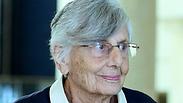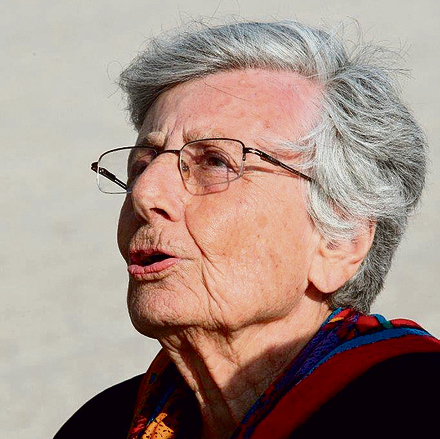

After we, the Holocaust survivors, are gone
Two years ago, on Holocaust Remembrance Day, Yedioth Ahronoth published a special column by writer and translator Ruth Bondy about the day when no Holocaust survivors would remain. Bondy, who survived Auschwitz and Bergen Belsen, passed away five months ago. Now, her chilling words take on a new meaning.
The German reparation offices and the Israeli Finance Ministry’s Bureau for Rehabilitation of Disabled Holocaust Survivors, for example, which will get rid of expenses. The institutions for the restitution of Holocaust victims’ property: There will be fewer claims, and the lawyers—who handled or mishandled them—will be able to fly comfortably in business class and stay in luxury hotels.
The Holocaust researchers, with their exciting theses, which the data only need to be adapted to, will be relieved too. Finally, they will get rid of the Holocaust survivors, who only bothered them: What do they know, those who used to lie on filthy bunk beds, dreaming about bread. They were just there, while the researchers conducted thorough research.
Others will be burdened by our departure—they will no longer be able to speak out, on behalf of Holocaust survivors, against playing Richard Wagner’s music, which was supposedly played by bands of prisoners at the gates of the death camps, while in reality they played light rhythmic music suitable for going out to work and returning from it. Nor will they be able to disqualify a swastika in an Israeli artist’s display, which is supposed to offend them, while no reservations had been made on their behalf against (slain Prime Minister Yitzhak) Rabin’s figure in SS uniform.

I haven’t been authorized to speak on behalf of the Holocaust survivors either, because they are not a homogenous bunch. But I do have one personal request: Change the main Holocaust remembrance ceremony at Yad Vashem, so that in the future it won’t be used by any politician, from the Right or from the Left, to give a speech for his own purposes. After all, there are enough poems written by children in the Holocaust, diaries and authentic farewell letters.
And put an end to the outrageous “marches of the livings,” to the school trips to places where Jews died, instead of to places where they lived—Toledo, Segovia, Rembrandt and Spinoza’s Holland, Odessa, and perhaps one day to Baghdad.
Upon our departure, the pain over an extinct world, which has accompanied us our entire lives, will be gone.
And yet, with all the research and reading, I am still unable to grasp how the extermination of Jews could have even happened.
And the evil hasn’t been gone into extinction.
Ruth Bondy passed away on November 14, 2017.
















